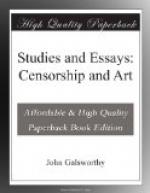But let us now consider the case of Science. It will not, indeed cannot, be contended that the investigations of scientific men, whether committed to writing or to speech, are always suited to the taste and capacities of our general public. There was, for example, the well-known doctrine of Evolution, the teachings of Charles Darwin and Alfred Russet Wallace, who gathered up certain facts, hitherto but vaguely known, into presentments, irreverent and startling, which, at the time, profoundly disturbed every normal mind. Not only did religion, as then accepted, suffer in this cataclysm, but our taste and feeling were inexpressibly shocked by the discovery, so emphasised by Thomas Henry Huxley, of Man’s descent from Apes. It was felt, and is felt by many to this day, that the advancement of that theory grossly and dangerously violated every canon of decency. What pain, then, might have been averted, what far-reaching consequences and incalculable subversion of primitive faiths checked, if some judicious Censor of scientific thought had existed in those days to demand, in accordance with his private estimate of the will and temper of the majority, the suppression of the doctrine of Evolution.
Innumerable investigations of scientists on subjects such as the date of the world’s creation, have from time to time been summarised and inconsiderately sprung on a Public shocked and startled by the revelation that facts which they were accustomed to revere were conspicuously at fault. So, too, in the range of medicine, it would be difficult to cite any radical discovery (such as the preventive power of vaccination), whose unchecked publication has not violated the prejudices and disturbed the immediate comfort of the common mind. Had these discoveries been judiciously suppressed, or pared away to suit what a Censorship conceived to be the popular palate of the time, all this disturbance and discomfort might have been avoided.
It will doubtless be contended (for there are no such violent opponents of Censorship as those who are threatened with the same) that to compare a momentous disclosure, such as the doctrine of Evolution, to a mere drama, were unprofitable. The answer to this ungenerous contention is fortunately plain. Had a judicious Censorship existed over our scientific matters, such as for two hundred years has existed over our Drama, scientific discoveries would have been no more disturbing and momentous than those which we are accustomed to see made on our nicely pruned and tutored stage. For not only would the more dangerous and penetrating scientific truths have been carefully destroyed at birth, but scientists, aware that the results of investigations offensive to accepted notions would be suppressed, would long have ceased to waste their time in search of a knowledge repugnant to average intelligence, and thus foredoomed, and have occupied themselves with services more agreeable to the public taste, such as the rediscovery of truths already known and published.




